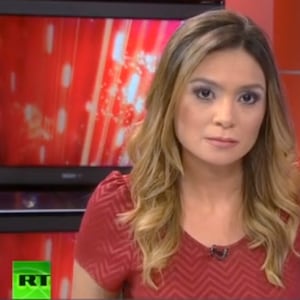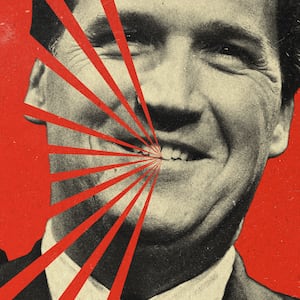Working in a Russian newsroom nearly a decade ago prepared me for modern day America. In both environments, conspiracy theories, false equivalencies, and half-truths infect the discourse and deform reality. In this current environment, truth and fact struggle to break through the paranoid and misinformed noise.
One thing that is clear to me: Fox News hosts like Tucker Carlson, along with other right-wing media figures, are at times indistinguishable from the propaganda on my former network, RT, a Kremlin-funded cable news channel that eagerly uses American voices to push a pro-Russia agenda.
Among the Americans that currently host television shows on RT are a range of voices on the extreme ends of the left-right ideological spectrum. Scottie Nell Hughes, a former pro-Trump pundit on CNN and Fox News, hosts a show that claims to provide unbiased coverage, while Canadian actor William Shatner hosts a program where he uses his star power to interview other celebrities like astrophysicist Neil deGrasse Tyson. Far-left journalist Chris Hedges, meanwhile, hosts a show featuring “dissident voices,” ostensibly dedicated to the cause of anti-imperialism, yet has failed to even mention Russia’s actual attempted authoritarian land grab of a democracy.
ADVERTISEMENT
Other American voices frequently amplified on RT include former Democratic congresswoman-turned-CPAC speaker Tulsi Gabbard, libertarian politician Ron Paul, and his son, Sen. Rand Paul (R-KY)—all of whom share foreign policy positions that Russia now finds beneficial to amplify.
What these figures don’t seem to understand or ignore is that RT uses their stateside fame and clout to drive eyeballs to its YouTube channel and legitimacy to its brand.
During the Trump years, the channel routinely featured videos and friendly headlines of Trump himself and his radical supporters. Popular themes on the channel were Trump’s denigration of NATO and the European Union. One video on RT’s YouTube channel features Trump’s former National Security Adviser Michael Flynn at an RT event, being interviewed by the channel’s Russia-based host, wearing an RT lanyard. The video of the event, which originally took place in 2015, was posted after Trump was elected, with the credulous headline “2013 gas attack in Syria a ‘false flag?’: Michael Flynn, Trump’s national security advisor at RT10.” The video ostensibly served two functions: to show Flynn’s support of the Kremlin-backed station, and to use the prestige of a U.S. national security adviser to push a conspiracy theory about the origin of chemical weapons in Syria. Just this week, Flynn once again helpfully advanced Russia’s agenda by releasing a statement where he blamed President Joe Biden for “ignoring Putin’s legitimate security concerns, and the legitimate ethnic problems in Ukraine” as Russian tanks rolled into Ukraine and began a full-scale invasion.
Even as Russian forces surrounded Ukraine, Russian media played clips of Trump calling Putin’s military strategy “genius” and “wonderful.” And to strengthen Russia’s case for invading a democracy, it played footage of Trump’s Secretary of State Mike Pompeo praising Putin and clips from Fox News host Tucker Carlson proudly siding with Russia.
In fact, Carlson’s praise of Putin has been a recurring theme on his show in recent weeks. “Why would we take Ukraine’s side and not Russia’s side? I’m totally confused,” asked Carlson, seemingly unsatisfied when his guest reminded him that the U.S. is for democracies and against authoritarian regimes.
In another bizarre attempt to defend Putin as morally superior to Democrats, Carlson asked his audience, “Has Putin ever called me racist? Has he ever threatened to get me fired for disagreeing with him? Has he shipped every middle class job in my town to Russia?” The question appealed to his audience’s aversion to all things liberalism and its right-wing populist grievances about immigration and the economy.
This sort of blunt support for Putin was atypical of even a Russian newsroom.
While the American voices Russian media uses to influence Western audiences hail from the far-left and the far-right, the poison of disinformation asymmetrically originates on the ideological right. Research has demonstrated that followers of the former president stick to hyper-partisan and conspiracy-laden sources such as Breitbart, Info Wars, and Fox News. During Trump’s election and throughout his presidency, the rightwing ecosystem grew more conspiratorial, extreme, and anti-democratic. It is during this time that Russian media and right-wing media became indistinguishable.
Today, the chief purveyors of pro-Russian disinformation in the U.S. are now on Fox News. I have warned that quite often the pro-Putin claims on Fox and RT essentially mimic each other. But much of the American public, and even many in the mainstream media, fail to realize the extent to which this disinformation has become part of the fabric of the new media landscape, and therefore, American political discourse.
At this point, zeroing in on RT as the source of authoritarian disinformation is a red herring. Pro-Putin, pro-Trump, and anti-democratic messaging has been ingrained into our government through conspiracy theorists and useful idiots currently sitting in U.S. Congress, like Marjorie Taylor Greene and Madison Cawthorn. The narratives blare into the homes of millions through television channels like Newsmax, One America News, and most consequentially, Fox News, the most-watched cable news channel on the planet. Far from being a problem that impacts both political parties equally, the alt-right media ecosystem including mainstream figures like Carlson air Putin-brand messaging aimed to break down democracy.
Today, pro-Putin and pro-Trump media sources online and on cable TV promote each other’s anti-democratic agendas. The messages are amplified on Facebook, Twitter, YouTube, and newer to the scene, TikTok, where false or misleading videos about the invasion of Ukraine have racked up millions of views. Authoritarian disinformation is amorphous, diffuse, and has very real impacts on America’s beliefs. Recent polling shows Republicans view Putin more favorably than Democrats, perceiving him to be a “stronger leader” than President Biden. Such polling further shows how both Putin and American right-wing media’s messaging appeals to Christian nationalism, white supremacy, and admiration for strong-man authoritarians.
Of course, another narrative that is guaranteed to circulate on social media and even among academic circles is the fallacy that all narratives are created equal; that the pro-democracy U.S. is ultimately no better than the authoritarian Russian regime. These voices and these narratives get spotlighted on Russian state media and among a sprawling network of sympathetic outlets, bots, and trolls; and will be parroted by the likes of Carlson to millions of viewers that have already drifted towards authoritarianism.
Fox and RT have both already used the conflict to score political points against Biden and his allies. As the pro-democracy world watches Ukrainian President Volodymyr Zelensky’s bravery and resolve defending against the invasion of his country, the far-right/Putin media alliance has accused him of being a “globalist puppet of Soros and the Clintons.”
And that’s just a preview of the coming deluge of “whataboutism,” a tactic I saw weaponized inside a Russian newsroom. It holds power by tapping its ability to draw support for false equivalencies, in which U.S. and NATO’s attempted takedown of the Taliban in Afghanistan is equal to Russia’s hostile takeover of a democracy. There will be attempts to change the subject and absolve Putin of accountability by asking, “What about Iraq? What about Afghanistan?” Engaging in this sort of discourse holds powerful propaganda value because of its element of truth: that the U.S. is not historically blameless.
Another propaganda tactic already being mobilized is the false accusations that pro-democracy voices are engaging in some sort of new McCarthyism. Similarly, there are accusations of a “Red Scare,” accusing those who call out Putin apologists as being “Russophobes.”
The intermixed right-wing media and Russian media will attempt to gaslight you. They will point to some of its truthful coverage in Ukraine to deny the fact that its most-watched propagandists praised Putin in the lead-up to the invasion and continue to undermine his opponents.
Responding to Russia’s invasion of her country, former member of Ukrainian Parliament, Nataliya Katser-Buchkovska, explained to me what’s at stake. She has spent her career working to build democracy in Ukraine and accelerating the country toward renewable energy. “This is an existential crisis, the struggle of the past against the future, democracy and autocracy, truth and lies.” It’s a struggle all democracies now face.









